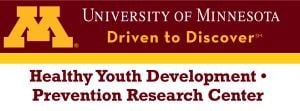Healthy Youth Development – Prevention Research Center
Population of Focus: adolescents
Topic Areas: youth, child, and adolescent development, education, adolescent health
Introduction, Mission, and Vision

HYD-PRC focuses on giving adolescents the skills, opportunities, and support they need to live healthy, meaningful lives.
The University of Minnesota’s Healthy Youth Development – Prevention Research Center (HYD-PRC) is one of 26 Prevention Research Centers (PRCs) supported by the Centers for Disease Control and Prevention (CDC) for the 2019–2024 funding cycle. Each PRC is funded to establish and maintain their center and to conduct a core research project. PRCs may receive supplemental funding to conduct additional research projects and activities.
HYD-PRC’s mission is to develop and share knowledge and best practices to give adolescents the skills and opportunities necessary to live healthy, meaningful lives. It provides expertise and technical assistance on adolescent health research and supports the widespread use of evidence-based health promotion and disease prevention policies, programs, and practices. The goal is to reduce health disparities among young people in Minnesota.
HYD-PRC’s vision is that effective policies, programs, and practices that promote adolescent health, healthy development, and health equity are implemented across Minnesota and the nation. Its research and translation efforts are grounded in a healthy youth development paradigm that views adolescents as resources, full of potential that can be nurtured through intentional strategies and opportunities to build health, competence, and capacity in the second decade of life and beyond.
HYD-PRC researchers believe that investing time and money in adolescent health can generate a triple “dividend” for health—during adolescence itself, across the life span, and when adolescents become parents themselves. To help grow these dividends, HYD-PRC partners with local, county, and state health departments; youth-serving organizations; and communities that share its commitment to promoting health, healthy development, and health equity among all young people.
Core Research
Each PRC uses a community-engaged approach to conduct one primary applied public health prevention research project called a core research project. Project activities include design, development, implementation, evaluation, and dissemination. PRCs use at least 50% of their CDC funding to conduct the project in partnership with communities.
TALK: Toolkit for Adolescent Care
HYD-PRC’s core research project for the 2019–2024 funding cycle expands on an earlier project called the Confidential Adolescent Sexual Health Services (CASH) study. The results of this study showed that parents and teens want to talk with their primary care providers about a wide range of psychosocial and sexual health topics, but they may not have an opportunity or know how to start. The study also found that most parents are comfortable with one-on-one time between their adolescent and clinician, especially when it is framed as an opportunity to teach adolescents to take more responsibility for their own health.
The new project, TALK: Toolkit for Adolescent Care, is a clinic-level program designed to help rural primary care clinics and clinicians provide high-quality preventive care related to psychosocial and sexual health. It supports conversations between adolescents and parents by:
- Training clinicians to talk about sensitive topics with teens and their parents in supportive and motivating ways.
- Helping clinicians use the information, resources, and talking points in the toolkit to have effective conversations with parents and teens.
- Providing a set of adolescent-friendly clinic practices to make one-on-one time between clinicians and teens standard. These practices include sending a “welcome to adolescent care” letter to parents and teens before adolescent preventive care visits.
The TALK program will be implemented and tested in primary care clinics across Minnesota.
Additional Research
PRCs may receive supplemental funding to work on additional research projects each funding cycle. These Special Interest Projects (SIPs) focus on a variety of health topics or gaps in scientific evidence. PRCs can also conduct additional research as part of SIP Thematic Research Networks, which are groups of PRCs working together on related health topics.
PRC Vaccine Confidence Network (PRC VCN)
In April 2021, CDC funded a 12-month award to all 26 PRCs to form the PRC VCN in support of the agency’s Vaccinate with Confidence strategy for COVID-19. As part of this network, HYD-PRC is examining vaccine hesitancy to find ways to promote vaccine confidence, increase vaccine uptake, and reduce disparities among incarcerated people and correctional facility staff in Minnesota and among young people experiencing homelessness in Hennepin County, the state’s most populous county. The goal is to reduce the incidence of COVID-19 in the United States.
HYD-PRC’s strategy includes collecting data to guide tailored media messaging campaigns and in-person vaccination events. It will also collect feedback from affected communities, giving them the opportunity to shape solutions that can be used by public health systems and services.
COVID-19 Vaccine Confidence in Minnesota’s Prisons and Jails
Use of a Pyramid Mentoring Model to Integrate Social Emotional Learning into Physical Activity Afterschool Programming for Secondary School Students
DiscoverU is a “whole-person” health and wellness mentoring afterschool program in which college-age students are trained to mentor diverse adolescents by acting as role models and doing program activities with them. Programming integrates areas of social emotional development into physical activity and nutrition activities to simultaneously promote the physical and mental health of middle and high school students in schools that serve adolescents from economically challenged backgrounds.
Supporting and Evaluating Initiatives to Prevent Overservice of Alcohol
This SIP seeks to evaluate the effects of Place of Last Drink (POLD) enforcement on alcohol-related traffic crash injuries, deaths, and use of emergency medical services. It is also assessing implementation of POLD enforcement across different communities.

Location: Minneapolis, Minnesota
Principal Investigator: Rebecca Shlafer, PhD, MPH
Email: shlaf002@umn.edu
Deputy Director: Jamie Grilz
Email: jkgrilz@umn.edu